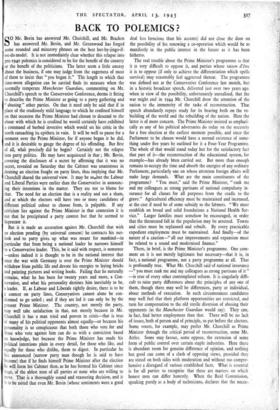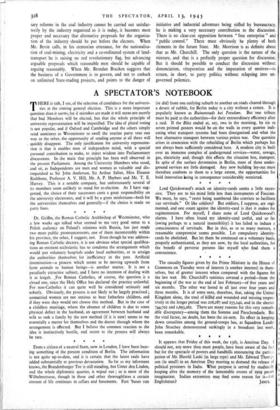BACK TO POLEMICS ?
SO Mr. Bevin has answered Mr. Churchill, and Mr. Bracken has answered Mr. Bevin, and Mr. Greenwood has forged some rounded and minatory phrases on the best but-by-jingo-if- we-do model. It is not immediately clear whether this relapse into pre-1940 polemics is considered to be for the benefit of the country or the benefit of the politicians. The latter seem a little uneasy about the business, if one may judge from the eagerness of most of them to insist that " you began it." The length to which that time-worn allegation can be carried finds its measure when the normally temperate Manchester Guardian, commenting on Mr. Churrhill's speech to the Conservative Conference, deems it fitting to describe the Prime Minister as going to a party gathering and abusing " other parties. On that it need only be said that if in place of the studiously mild language to which he confined himself on that occasion the Prime Minister had chosen to descend to the abuse with which he is credited he would certainly have exhibited a command of barbed invective which would set his critic in the north ransacking its epithets in vain. It will be well to pause for a moment over the Prime Minister, for if anyone began it he did, and it is desirable to gauge the degree of his offending. But first of all, whit precisely did he begin? Certainly not the relapse into party politics. He may have acquiesced in that ; Mr. Bevin, covering the disclosure of a secret by affirming that it was no secret, revealed on Saturday that the Cabinet was unanimous in desiring an election fought on party lines, thus implying that Mr. Churrhill shared the universal view. It may be so,.but the Labour and Liberal Parties were earlier than the Conservative in announc- ing their intentions in the matter. They are not to blame for that. The need for an election that is a reality and not a sham, and at which the electors will have two or more candidates of different political colour to choose from, is palpable. If any criticism lies against the Prime Minister in that connexion it is not that he precipitated a party contest but that he seemed to deprecate it.
But it is made an accusation against Mr. Churchill that with an election pending (by universal consent) he contracts his out- look and to party gives up what was meant for mankind—in particular that from being a national leader he narrows himself to a Conservative leader. This, be it said with respect, is nonsense —unless indeed it is thought to be in the national interest that once the war with Germany is over the Prime Minister should withdraw from public life and devote his energies to laying bricks and painting pictures and writing books. Failing that he naturally remains, what he has been for twenty years and more, a Con- servative, and what his personality destines him inevitably to be, a leader. If, as Labour and Liberals rightly desire, there is to be a contest on party lines, Conservatives cannot alone be con- demned to go unled ; and if they are led it can only be by the present Prime Minister. The country, not merely the party, may well take satisfaction in that, not merely because in Mr. Churchill it has a man tried and proven in crisis—that is true of many of his political opponents almost equally—or because his personality is so conspicuous that both those who vote for and those who vote against him can do so with a conviction based on knowledge, but because the Prime Minister has made his Political intentions plain in every detail, for those who like, and equally for those who dislike, them to digest. In particular he has announced (narrow party man though he is said to have become) that if he finds himself Prime Minister after the election he will form his Cabinet then, as he has formed his Cabinet since 1940, of the ablest men of all parties or none who are willing to serve. That is a thoroughly sound and reassuring decision, and it 's to be noted that even Mr. Bevin (whose sentiments were a good deal less ferocious than his accents) did not close the door on the possibility of his renewing a co-operation which would be as manifestly in the public interest in the future as it has been hitherto.
The real trouble about the Prime Minister's programme is that it is very difficult to oppose it, and parties whose raison d'être it is to oppose (if only to achieve the differentiation which spells survival) may reasonably feel aggrieved thereat. The programme was defined not at the Conservative Conference last month, but in a historic broadcast speech, delivered just over two years ago. when in view of the possibility, unfortunately unrealised, that the war might end in 1944 Mr. Churchill drew the attention of the nation to the immensity of the tasks of reconstruction. That speech abundantly repays study for its bearing both on the re- building of the world and the rebuilding of the nation. Here the latter is of more concern. •The Prime Minister insisted as emphati- cally as any of his political adversaries do today on the necessity for a free election at the earliest moment possible, and since the Parliament to be chosen would have a normal existence of some- thing under five years he outlined for it a Four-Year Programme. The whole of that would stand today but for the satisfactory fact that part of it—the reconstruction of the educational system, for example—has already bten carried out. But more than enough remains to occupy the time and absorb the energies of any ordinary Parliament, particularly one on whose attention foreign affairs will make large demands. What are the main constituents of the programme? " You must," said the Prime Minister, " rank me and my colleagues as strong partisans of national compulsory in- surance for all classes for all purposes from the cradle to the grave." Agricultural efficiency must be maintained and increased, at the cost if need be of some subsidy to the farmers. " We must establish on broad and solid foundations a National Health Ser- vice." Larger families must somehow be encouraged, in order that the threatened fall in the population may be arrested. Towns and cities must be replanned and rebuilt. By every practicable expedient employment must be maintained. And finally—of the nature of a caution—" all our improvements and expansion must be related to a sound and modernised finance."
There, in brief, is the Prime Minister's programme. One com- ment on it is not merely legitimate but necessary—that it is, in fact, a national programme, not a party programme at all. That is profoundly true. What Mr. Churchill said of national insurance —" you must rank me and my colleagues as strong partisans of it " —is true of every other contemplated reform. It is singularly diffi- cult to raise party differences about the principles of any one of them, though there may well be differences, party or individual, about methods of execution. In such circumstances candidates may well feel that their platform opportunities are restricted, and turn for compensation to the old sterile diversion of abusing their opponents (as the Manchester Guardian would say). They can, in fact, find better employment than that. There will be no lack of issues, both of person and of principle, to put before the electors. Some voters, for example, may prefer Mr. Churchill as Prime Minister through the critical period of reconstruction, some Mr. Attlee. Some may favour, some oppose, the extension of some form of public control over certain staple industries. Here there is abundant room for genuine difference of opinion, and nothing but good can come of a clash of opposing views, provided they are stated on both sides with moderation and without too compre- hensive a disregard of various established facts. What is essential is for all parties to recognise that these are matters on which honest men can differ honestly. When the Reid Commission, speaking purely as a body of technicians, declares that the neces-- sary reforms -in the coal industry cannot be carried out satisfac- torily by the industry organised as it is today, it becomes most proper and necessary that alternative proposals for the organisa- tion of the industry should be put before the electors. When Mr. Bevin calls, in his stentorian utterance, for the nationalisa- tion of coal-mining, electricity and a co-ordinated system of land- transport he is raising no red revolutionary flag, but advancing arguable proposals which reasonable men should be capable of arguing reasonably. When Mr. Brendan Bracken suggests that the business of a Government is to govern, and not to embark on unlimited State-trading projects, and points to the danger of initiative and industrial adventure being stifled by bureaucracy, he is making a very necessary contribution to the discussion. There is no clear-cut opposition between " free enterprise " and " public control." There must obviously be plenty of both elements in the future State. Mr. Morrison is as definite about that as Mr. Churchill. The only question is the nature of the mixture, and that is a perfectly proper question for discussion. But it should be possible to conduct the discussion without denunciation, vituperation and the imputation of motives—to return, in short, to party politics without relapsing into un- governed polemics.



























 Previous page
Previous page